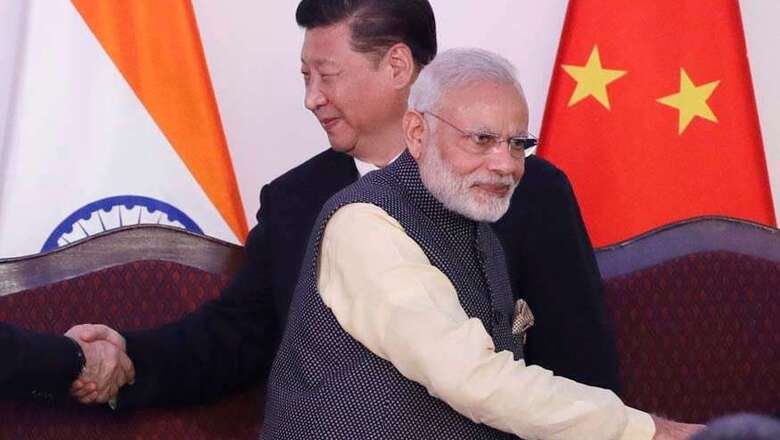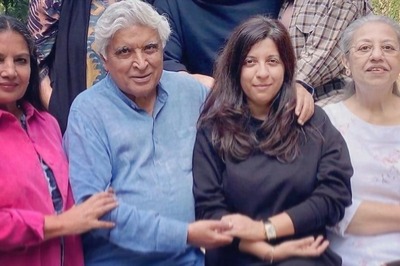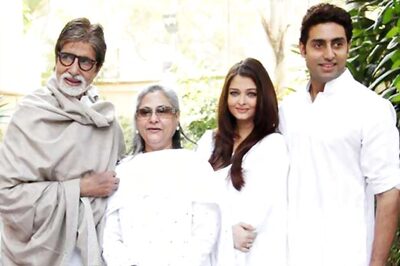
views
People have been quoting San Tzu, Chanakya and various warfare experts while discussing China-India clash, the most serious one since 1962. It would be frivolous to imagine that the current disturbance is related to a few square kilometres of land. This land grab has two objectives — first, grab the land for its strategic advantage and subdue the neighbour, a game it is trying against all its neighbours. Second, to put India down for daring to rise as a regional power and keep India occupied with the matters of securing its border and security environment. It is part of its hegemonic ambitions to dominate the world. This is the medieval imperialist strategy that ended with World War II.
China had two choices to be number one and dominate the world — a vision for which it had worked with single-minded devotion. One was ‘hard power’ — brute force — that it had accumulated over the last few decades. The other was ‘soft power’ accumulated from centuries old civilisation that had survived the worst attacks, coupled with its rise as a technology power. This prowess of stupendous growth on the shoulders of clear vision, technical prowess and ruthless communist state machinery had earned respect of the world that had closed its eyes to the undemocratic nature of its governance.
It is not that the world is not aware how a soft power can dominate others without any apparent use of force. The USA had shown the way post WWII. It provided soft loans even to erstwhile enemies of the war to help them rise out of their destruction, providing every kind of expertise. Along with it, it exported its apparent symbols of civilisational superiority built on its prosperity, overtly or covertly, and made US of A, a nation everyone wanted to be like.
Earlier Britain, too, had done well for itself by exporting its values, its education along with its brute power to colonise the world. It served it well. But it remained a conquest with force. The US colonised major parts of the world with its soft power. So Hollywood, music, consumerism, extreme form of individual freedom — all aspects of Americanism were copied by the world. The iron curtains and bamboo curtains, too, couldn’t stop its march into the minds of the people globally. Even people who hated it, wished to be like it. Communist China is the prime example of Americanisation with only control of resources moving from private hands to oligarchy of Communist Party and its centralised control and command system.
China is well aware of its civilisational richness. But the Communist Party’s allergy to things old didn’t allow it to own up its past fully. It chose only its militarist glory. However, there is a sense of pride in Chinese about their rich heritage and knowledge system. There is clarity.
China is the only nation that has not allowed the westerners to set the narrative about its civilisation, much unlike India. They have their own intellectuals, their own think tanks to present China and its civilisation as they see it, refusing to agree to western terms or perception. They have invested in western universities heavily to correct the narrative about it in the west. The initial investment in these will pay off in the coming years, unless China decides to let this ground work be buried by its militarist establishment.
China was clear that it could dominate the globe in coming years by investing its huge surplus finances in different countries. Its investment in OBOR was the result of overweening ambition to dominate the world with its economic prowess and persuading economically weaker economies to become part of its economic empire and also open themselves to Chinese investments. It was the new world imperialism idea at its best. And, no one seemed to be upset or any wiser. There were murmurs of unease when it went onto purchase and control major natural resources in African continent, but no one could do much in this commercial enterprise.
The magic potion went a little sour when China turned out to be a kind of international Shylock by charging huge interests, leading to bankruptcy of many smaller countries. Many countries went back on their deals. This is where China lost the plot. It didn’t copy the US model of economic domination well. The US was almost like a benign Uncle Sam to the struggling economies with soft domination over unsuspecting people. China chose to be a Shylock. This hurry to control the world was its first misstep in becoming what many had accepted — to be the No. 1 power in the world.
China could have easily recovered from these mistakes and continued its march. But then it made much bigger blunders by using the hard power option to dominate the world with military power. It began with Japan, then every smaller country under its belly and then a big neighbour like India. While USA took its allies along and shared its power and prosperity, China wanted everything for itself. It has only two friendly neighbours now — despot North Korea and Pakistan, which is not a neighbour actually. It became a neighbour by virtue of India’s mistakes in 1947 and 1962. How well can a failed nation support China’s ambitions, is anybody’s guess. Even globally, China is not left with many all-weather friends.
To spoil the game for China, virus entered the scene with Wuhan as its epicentre. And, China’s irresponsible behaviour as a global citizen has upset all the countries in the world. China’s absolute domination as world supplier of pharmaceuticals — directly and indirectly, and its strong supply chain could have made China a darling of the world community at this juncture, had Communist thought process not suppressed its ancient wisdom. This disaster, whatever the origin of the virus, could have been its greatest opportunity had the inherent communist secretiveness not overtaken its native wisdom.
Even as it was being isolated worldwide due to Wuhan/Corona curse, it went on military rampage not only against India but also against smaller neighbours, looking at the world through the glasses of Middle Kingdom, not realising the world has changed totally. It failed to realise that India is no more the India of 1962. It is no more a timid neighbour and has its own vision of greatness built on its ancient heritage and knowledge. India was the most peaceful neighbour of China for 2,000 years. It was, in fact, its spiritual Guru. Had China decided to cooperate with India, the two could have again dominated the world with their soft power the way they had done millennia back. This is what Prime Minister Narendra Modi had in mind when he went out of way to engage with China.
China sympathisers within India don’t realise that in the longer term, China has lost the global war of perception. In fact, this is where China went wrong. It had reached a stage where it could dominate the world with sheer soft power, but Xi Jinping was in a hurry and chose hard power. The urge to complete something in one lifetime that needed a couple of generations is his undoing. Xi has lost the plot. Now, I see no hope for China to ever become unchallenged leader of the world, unless it decides to retrace its steps. Empires of the future can’t be built on hard power. In fact, you can no more build empires in today’s world. You can build big alliances, built on goodwill and soft power and dominate the world in a positive sense. India has an opportunity here. Let us hope that we Indians realise this.

















Comments
0 comment